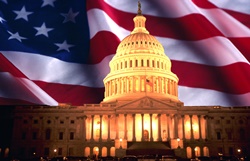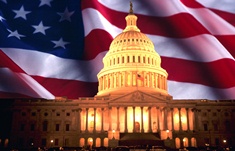 The U.S. House of Representatives was on a week-long recess, which means our delegation was back home and visiting with their constituents around the state. The Senate, however, remained in D.C. working. Both will continue on the job in Washington starting next week until their recess around Memorial Day. A few news and notes:
The U.S. House of Representatives was on a week-long recess, which means our delegation was back home and visiting with their constituents around the state. The Senate, however, remained in D.C. working. Both will continue on the job in Washington starting next week until their recess around Memorial Day. A few news and notes:
* Congressman Larry Bucshon, M.D. (IN-08) held a job fair in Terre Haute on Wednesday in coordination with WorkOne Western Indiana, Indiana State University and the Terre Haute Chamber of Commerce. The event, held at Indiana State University’s Hulman Center, afforded potential employees the opportunity to meet with employers hiring in the Wabash Valley. A special emphasis was given to hiring veterans.
* Bucshon recently attended the Indiana Chamber’s I-69 Regional Summit in downtown Indianapolis. He was fresh from the floor vote in Congress on health care reform and also took time to meet with Chamber executives to discuss the topic.
* Congressman Jim Banks (IN-03), a member of the House Armed Services Committee, issued the following statement on Thursday regarding reports that the Trump Administration is considering sending more American troops to Afghanistan:
“I am glad that President Trump is willing to seriously consider the request of his commanders on the ground, who are asking for additional forces. We’ve been at war in Afghanistan since 2001, but in recent years, decisions about troop levels have been based on politics instead of military strategy. We’ve invested too much blood and treasure in Afghanistan to tolerate a stalemate or defeat. I look forward to learning more about the administration’s plans in the coming days.”
* U.S. Sen. Joe Donnelly has released his Foundation for Families Agenda – a series of policy proposals aimed at improving the quality of life for Hoosier families. Included in the policy agenda:
- Paid family and medical leave
- Expanding access to pre-K and quality childcare options
- Affordable higher education
- Equal pay for women
Donnelly released a video explaining his agenda. He stated, “I am unveiling the Foundation for Families Agenda because we need to ensure our policies and priorities support hardworking Hoosier and American families. When our families succeed, so
does our economy. The foundation for our families should include family leave, options for affordable childcare and pre-K, access to an affordable college education, and the assurance that Hoosier women are paid equally when they do the same job as their male counterparts. These are common sense ideas that I am hopeful we can advance in a bipartisan manner in the Senate.”
* Many news organizations are speculating that a potential candidate to be the new FBI director might be the current president of Anderson University, John Pistole. Pistole is former deputy director of the FBI (and led significant counter-terrorism efforts) and past head of the Transportation Security Administration. He has declined all requests for interviews since the speculation began, but a few friends and family spoke to the Indy Star.
* Indiana Secretary of State Connie Lawson has been tapped to serve on President Trump’s national commission investigating the integrity of American elections; see The Northwest Indiana Times story. Vice President Mike Pence is chairing the commission.

 Nate Silver has built a brand as a successful prognosticator of U.S. elections — and fantasy baseball projections, for the record. So Democrats are understandably concerned about his prediction that Republicans will regain the U.S. Senate in 2014.
Nate Silver has built a brand as a successful prognosticator of U.S. elections — and fantasy baseball projections, for the record. So Democrats are understandably concerned about his prediction that Republicans will regain the U.S. Senate in 2014.  For politicos, Indiana's 2012 U.S. Senate primary and election had it all: Drama. Faction rivalries. Gaffes. But if it was up to some legislators, the ultimate victor would not be left up to the general voting public.
For politicos, Indiana's 2012 U.S. Senate primary and election had it all: Drama. Faction rivalries. Gaffes. But if it was up to some legislators, the ultimate victor would not be left up to the general voting public.
 Elections, no matter the year, do make a difference. Sure, some are more important than others. Michael Davis, who led the Indiana Chamber’s political affairs efforts before joining BIPAC in Washington, offers his analysis of what next week’s national votes mean for the states involved and for 2012. Here are some excerpts:
Elections, no matter the year, do make a difference. Sure, some are more important than others. Michael Davis, who led the Indiana Chamber’s political affairs efforts before joining BIPAC in Washington, offers his analysis of what next week’s national votes mean for the states involved and for 2012. Here are some excerpts: Though we’re now more than a month past the November elections, I still get the jitters when I turn on the television and see what looks like the potential for a political advertisement. I’m probably not the only one, either, following a particularly negative campaign season.
Though we’re now more than a month past the November elections, I still get the jitters when I turn on the television and see what looks like the potential for a political advertisement. I’m probably not the only one, either, following a particularly negative campaign season. An innovative vote center option has been unable to expand beyond the pilot stage in Indiana. In Hawaii, meanwhile, various methods of casting absentee ballots are in play with an effort to institute all-mail elections. The Honolulu
An innovative vote center option has been unable to expand beyond the pilot stage in Indiana. In Hawaii, meanwhile, various methods of casting absentee ballots are in play with an effort to institute all-mail elections. The Honolulu  Quirky Congressional calendars and policy stalemates are nothing new in Washington. For those of that mindset, it appears the rest of 2010 won’t be too upsetting. And with some of the damage Congress has inflicted on businesses of all sizes and their employees over the last few years, maybe that isn’t all bad.
Quirky Congressional calendars and policy stalemates are nothing new in Washington. For those of that mindset, it appears the rest of 2010 won’t be too upsetting. And with some of the damage Congress has inflicted on businesses of all sizes and their employees over the last few years, maybe that isn’t all bad.